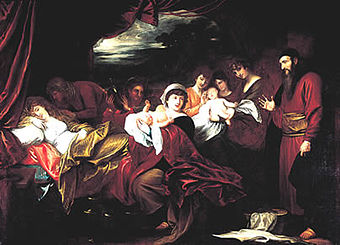
Fiddler on the roof on ice
5774-2013
Isaac Blessing Jacob (engraving by
from the 1865 La Sainte Bible)
How can we understand the actions of Jacob,
who with the help of his mother Rebekah,
plots to steal the blessing promised to Esau
and trick his blind MORE>

They pray to God. Rebekah soon feels violent
movement within her womb. She asks God why
she feels fighting within her, and God answers,
“Two nations are in your womb and two states.
They will be divided from one another, starting
from within you. One state shall become mightier
than the other and the mighty
one shall serve the lesser.” More
********************
MORE COMMENTARIES
MORE COMMENTARIES
from Torah Topics for Today
from Hillel
from Jewish Outreach Initiative
from AJWS
from Women of Reform Judaism
from JTS
from Bronfman Youth Fellowships
a Kveller MOMentary
Isaac, A Lover of Peace
(illustration from a Bible card published 1906
by the Providence Lithograph Company)
********************
Rav * KOOK *
* Torah * Institute
************************
God's expectations for the
Malakhi lived in the 5th century BCE
and was the last of all of the prophets.
Because Malakhi means "my messenger,"
it is probably not a personal name, but
rather a vague title for a man who was
known only as a messenger fromGod.
His short book of prophecy is full of
frustration and disappointment with
the people and their lackluster
Temple service
******************
Revelations from God
Prophecy in the Biblical Sense
The authority of the traditions
of the Bible in Judaism is
founded prophets
The Bible describes various people
as having received direct revelations
from God. The revelation to Moses is
seen by later tradition as prophecy par
excellence.
In the accounts of the patriarchs, we
encounter God in relation to man,
communicating directly with him.
This is not prophecy in the strict sense,
however, since the phenomenon of
prophecy, in the biblical view, involves
the prophet's having been charged with a
messageto communicate. It is only with
Moses, in the Book of Exodus, that we
encounter aprophet who is sent to the
people to deliver the word of God.
Interestingly enough, basic necessities such as providing
food, shelter, care, and love for a child are absent from
the list.Talmudists felt that these were items likely not
to be neglected by parents and therefore
unnecessary to mention. Instead, “spiritual care” items
are listed related to the obligation to provide a child with
knowledge about values, morals, and a sense of shared
history or collective memory (Torah).
OF THE WEEK
THIRD LESSON
OF THE WEEK
Made in Israel -- Why Israel?
Shabat Shalom
And Have A Wonderful Week











No comments:
Post a Comment